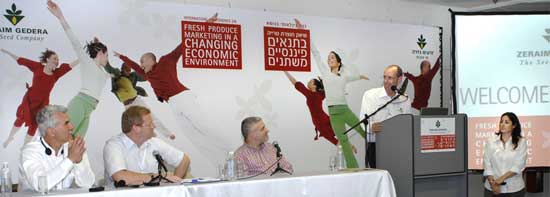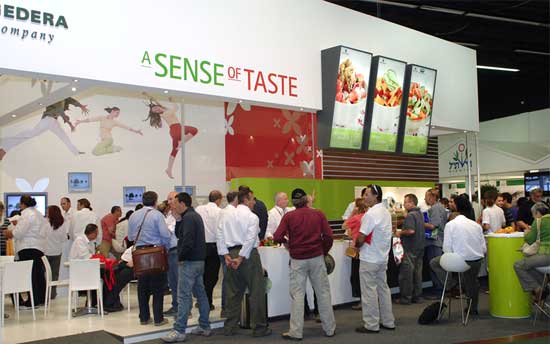Gedera, Israel
May 18, 2009
Growing tomatoes in extreme weather conditions is no easy task, but over the last 30 years or so, Israeli agriculture technologies have been designed to cope with whatever Mother Nature throws at them. It has taken special software, innovative dew collectors, novel fruit and vegetable varieties, drip irrigation, integrated pest control tactics, and state-of-the-art greenhouses, along with some "mother of invention" - Israeli style.
Faced with the region's desert climate, Israeli agronomists, entrepreneurs, academics and government agencies started focusing on agriculture primarily as a means to survive. The fruits of their labor were on show at the 17th Agritech exhibition, held May 5th-7th in Tel Aviv.
|

|
The fair drew 231 exhibitors - 175 of them Israelis and the rest from abroad - and over 30,000 visitors, both foreign and local. As opposed to previous Agritech exhibitions, the impression was that there were fewer visitors this year (perhaps due to the economic crisis). Nevertheless, the Seed Companies hall enjoyed a large flow of people throughout the fair.
Zeraim Gedera professionals - ranging from product managers to breeders to marketing managers - were present throughout the exhibition, welcoming and meeting the wide variety of people who came to our booth. Our visitors included growers, retailers, exporters and fresh produce wholesalers, as well as delegations from all parts of the world, and new and existing contacts. All our guests enjoyed the fascinating vegetables display, tasting and relishing our diverse tomato segments.
Zeraim Gedera's Roma type tomato, displayed at the fair, "enjoys a great taste, high yield and is consumed for cooking as well as for salads throughout Europe", says Gerry Kelman, ZG's Marketing Manager, VIM (Vertically Integrated Marketing).
Single and cluster tomatoes were on show, as well as cherry tomatoes such as the single, cluster, tear drop and taste varieties.
"One of these varieties is our tear drop-shaped cherry tomato, recently named Gocha", says Gerry, "which is used for vegetable salads and consumed as a snack around Europe. The fruit enjoys exceptional balanced taste, extended shelf-life both on the plant and post-harvest, and a rather unique shape. At the same time, the plant carries a heavy yield of fruit. Reactions have been amazing; a business colleague of mine from the UK has told me that he cooked Gocha and found that it has a perfect and distinct tomato flavour with a correct juiciness for cooking."
ZG's baby cucumbers were a big hit at the show and were consumed frequently by the guests. Also, the red, orange and yellow blocky peppers were arranged in bowls that surrounded the booth.
It wasn't just star-shaped squash and variously colored peppers at the center of attention at this year's convention. The dramatic rise in food prices, as well as global warming and the increasing lack of precipitation, has made agriculture the hottest topic worldwide. And so, many countries are searching for methods to increase agricultural output and reduce water consumption.
"The emphasis was on the water supply crisis, both for drinking and agriculture, which is becoming a decisive factor in the foodstuffs issue," explains Danny Meiri, Chairman of the Agritech convention. "The spotlight is now on efficient usage of resources and produce varieties with a longer shelf-life."
As someone who has been involved in such conventions since 1996, Meiri noted, "This year, more so than in the past, foreign visitors to the convention were much focused businesspeople, who knew how to ask the right questions and were guided towards the most appropriate meetings. The atmosphere in the hall was all business."
|

|
Many delegations made their way to the ZG booth and visited our company's site, including those from Uzbekistan, Georgia, Azerbaijan, Brazil, India and more. The large Brazilian delegation was composed of growers, fresh produce wholesalers and Ministry of Agriculture officials. As a major tomato producers' market, the Brazilian delegation was very interested in our tomato portfolio, with its wide range of segments. In a well presented lecture, the delegates heard about our different segments and were exposed to our TYLCV-resistant varieties, which address a problem local Brazilian growers are currently facing. During their tour of the company's plant and labs, the delegates also had the opportunity to get a better understanding of Zeraim Gedera's seed supply chain.
The company's booth was designed as a salad bar that enabled visitors to taste our shining stars, a unique interactive dining experience with diverse flavors and a friendly, informal atmosphere. Everyone was able to create their own entrée from an amazing variety of fresh, seasonal ingredients, including a variety of Zeraim Gedera's tomato and cherry tomato types, our freshly cut, colorful blocky peppers, cucumbers and sweet corn. Chef Ben Buchwaic, an international-style Israeli kitchen talent, enriched the diners with his unique variety of freshly cut salads.